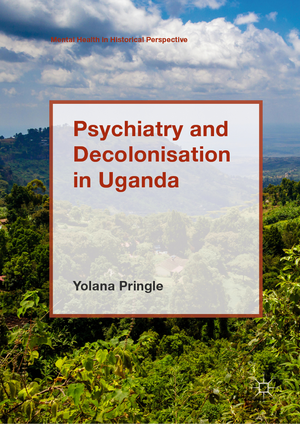Psychiatry and Decolonisation in Uganda: Mental Health in Historical Perspective
Autor Yolana Pringleen Limba Engleză Hardback – 19 dec 2018
| Toate formatele și edițiile | Preț | Express |
|---|---|---|
| Paperback (1) | 293.31 lei 6-8 săpt. | |
| Saint Philip Street Press – 7 oct 2020 | 293.31 lei 6-8 săpt. | |
| Hardback (2) | 226.07 lei 6-8 săpt. | |
| Palgrave Macmillan UK – 19 dec 2018 | 226.07 lei 6-8 săpt. | |
| Saint Philip Street Press – 7 oct 2020 | 371.97 lei 6-8 săpt. |
Din seria Mental Health in Historical Perspective
- 17%
 Preț: 364.28 lei
Preț: 364.28 lei -
 Preț: 282.24 lei
Preț: 282.24 lei -
 Preț: 148.04 lei
Preț: 148.04 lei - 18%
 Preț: 727.66 lei
Preț: 727.66 lei - 15%
 Preț: 640.24 lei
Preț: 640.24 lei -
 Preț: 458.78 lei
Preț: 458.78 lei -
 Preț: 346.86 lei
Preț: 346.86 lei - 15%
 Preț: 523.54 lei
Preț: 523.54 lei -
 Preț: 213.97 lei
Preț: 213.97 lei - 18%
 Preț: 787.47 lei
Preț: 787.47 lei - 15%
 Preț: 446.60 lei
Preț: 446.60 lei - 18%
 Preț: 889.75 lei
Preț: 889.75 lei - 15%
 Preț: 524.22 lei
Preț: 524.22 lei - 18%
 Preț: 786.18 lei
Preț: 786.18 lei -
 Preț: 233.40 lei
Preț: 233.40 lei - 15%
 Preț: 701.40 lei
Preț: 701.40 lei -
 Preț: 417.90 lei
Preț: 417.90 lei -
 Preț: 202.93 lei
Preț: 202.93 lei - 15%
 Preț: 523.72 lei
Preț: 523.72 lei - 18%
 Preț: 894.34 lei
Preț: 894.34 lei - 15%
 Preț: 504.99 lei
Preț: 504.99 lei - 15%
 Preț: 640.24 lei
Preț: 640.24 lei - 15%
 Preț: 706.30 lei
Preț: 706.30 lei - 15%
 Preț: 576.21 lei
Preț: 576.21 lei - 5%
 Preț: 158.80 lei
Preț: 158.80 lei -
 Preț: 319.98 lei
Preț: 319.98 lei -
 Preț: 227.42 lei
Preț: 227.42 lei
Preț: 226.07 lei
Nou
Puncte Express: 339
Preț estimativ în valută:
43.26€ • 45.26$ • 35.94£
43.26€ • 45.26$ • 35.94£
Carte tipărită la comandă
Livrare economică 02-16 aprilie
Preluare comenzi: 021 569.72.76
Specificații
ISBN-13: 9781137600943
ISBN-10: 1137600942
Pagini: 247
Ilustrații: XII, 259 p. 1 illus.
Dimensiuni: 148 x 210 x 33 mm
Greutate: 0.48 kg
Ediția:1st ed. 2019
Editura: Palgrave Macmillan UK
Colecția Palgrave Macmillan
Seria Mental Health in Historical Perspective
Locul publicării:London, United Kingdom
ISBN-10: 1137600942
Pagini: 247
Ilustrații: XII, 259 p. 1 illus.
Dimensiuni: 148 x 210 x 33 mm
Greutate: 0.48 kg
Ediția:1st ed. 2019
Editura: Palgrave Macmillan UK
Colecția Palgrave Macmillan
Seria Mental Health in Historical Perspective
Locul publicării:London, United Kingdom
Cuprins
1. Introduction.- 2. A Place on Mulago Hill.- 3. The ‘Africanisation’ of Psychiatry.- 4. ‘Mass Hysteria’ in the Wake of Decolonisation.- 5. The Psychiatry of Poverty.- 6. Mobility, Power, and International Mental Health.- 7. The ‘Trauma’ of War and Violence.- 8. Conclusion.-Bibliography.- Index
Recenzii
Notă biografică
Yolana Pringle is Senior Lecturer in the History of Medicine at the University of Roehampton, UK. Her research encompasses the history of psychiatry, humanitarianism, and violence and health, with a regional focus on East Africa. She has held previous posts at the University of Cambridge and the University of Warwick.
Textul de pe ultima copertă
This open access book investigates psychiatry in Uganda during the years of decolonisation. It examines the challenges facing a new generation of psychiatrists as they took over responsibility for psychiatry at the end of empire, and explores the ways psychiatric practices were tied to shifting political and development priorities, periods of instability, and a broader context of transnational and international exchange. At its heart is a question that has concerned psychiatrists globally since the mid-twentieth century: how to bridge the social and cultural gap between psychiatry and its patients? Bringing together archival research with oral histories, Yolana Pringle traces how this question came to dominate both national and international discussions on mental health care reform, including at the World Health Organization, and helped spur a culture of experimentation and creativity globally. As Pringle shows, however, the history of psychiatry during the years of decolonisation remained one of marginality, and ultimately, in the context of war and violence, the decolonisation of psychiatry was incomplete.
Caracteristici
Provides the first account of the rise, influence, and eventual decline of Uganda’s psychiatrists Offers a case study on the development of psychiatry as a transnational and global phenomenon Utilises oral history interviews, giving voice to psychiatrists, community mental health workers, traditional healers, and Ugandan elders
